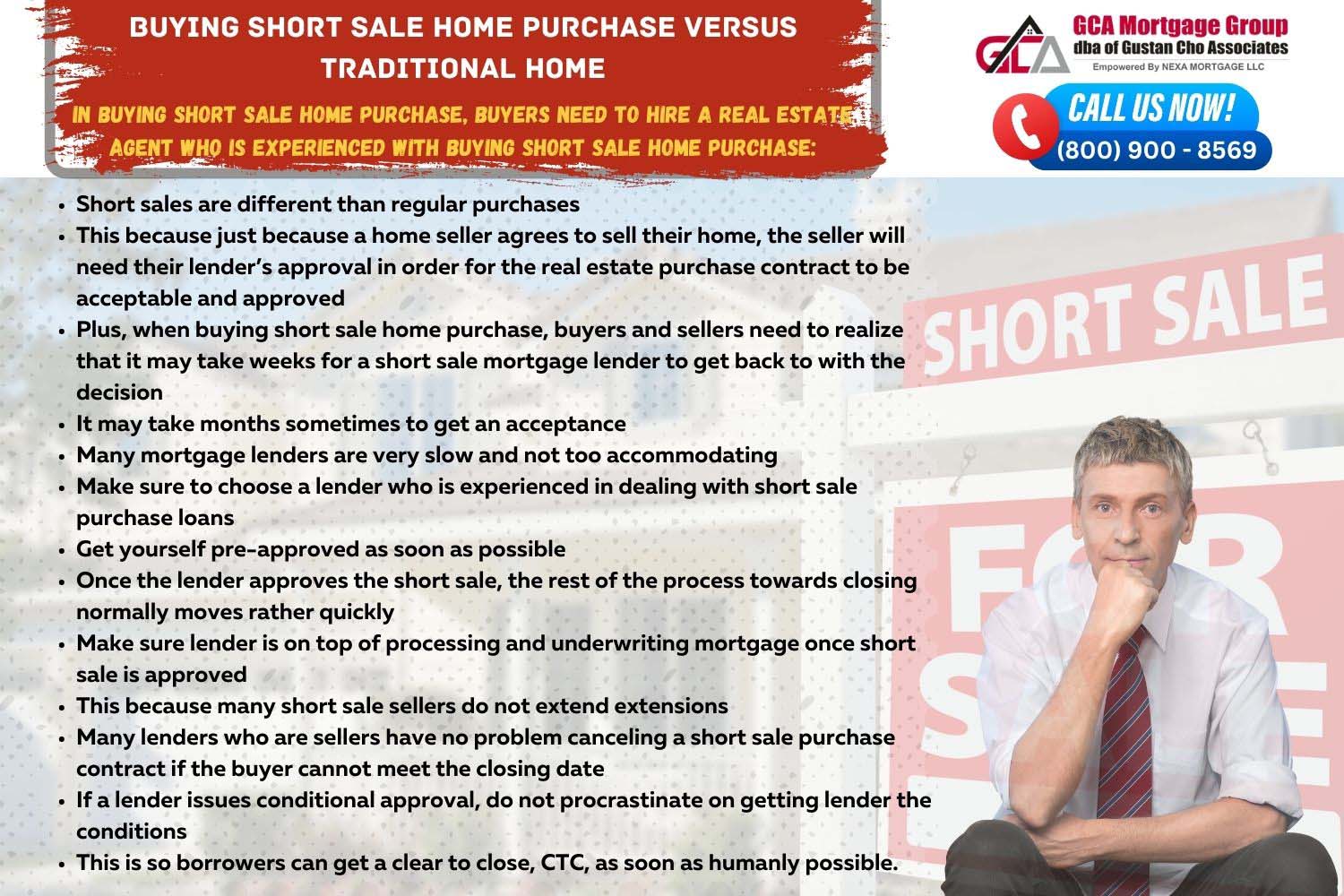Buying Short Sale Home Versus Traditional Home Purchase
Are you searching and wondering if buying short sale home might be a better deal than a traditional home purchase? You’re not alone. Many first-time and budget-conscious buyers consider short sales hoping for a discount but the process comes with its own unique challenges. In this blog, we’ll break down everything you need to know about buying a short sale home versus a traditional home purchase so you can decide what’s right for you.
What Is a Short Sale?
A short sale occurs when a homeowner is underwater on their mortgage owing more than the home is worth and the lender agrees to accept less than the full loan balance as payment. This permits the homeowner to avoid foreclosure and give the buyer an opportunity to purchase the home for less than its market value. Example:
- Mortgage balance: $250,000
- Home market value: $210,000
- Lender agrees to sell for $210,000 to avoid foreclosure.
The catch? The lender must approve the sale and that’s where delays and complications come in.
What Is a Traditional Home Purchase?
A traditional home sale is when a homeowner with equity in their home sells it to a buyer. The seller controls the timeline, price, and negotiations. The process is usually faster, simpler, and more predictable than a short sale.
Buying Short Sale Home
Once the lender agrees to a short sale request, hiring a real estate listing agent is the next step. Short sales are different than traditional real estate sales. The real estate agent should have knowledge and experience with short sales.
When buying a short sale property, seek out realtors who have extensive experience dealing with lenders who own the short-sale property.
Homeowners and home buyers will not want a rookie real estate agent who has never had experience with short sales representing them. The real estate agent should have had at least half a dozen short-sale transactional closings. They should understand the difficulty of working with the sellers and the lender.

Hiring Real Estate Agent on Buying Short Sale Home
In buying short-sale home purchases, buyers need to hire a real estate agent who is experienced with buying short sale home purchases. Short sales are different than regular purchases. This is because a home seller agrees to sell their home. The seller will need their lender’s approval for the real estate purchase contract to be accepted and approved. Plus, when buying short sale home purchase, buyers and sellers need to realize that it may take weeks for a short sale mortgage lender to get back to you with the decision.
It may take months sometimes to get an acceptance. Many mortgage lenders are very slow and not too accommodating. Make sure to choose a lender experienced in dealing with short sale purchase loans. Get yourself pre-approved as soon as possible. Once the lender approves the short sale, the rest of the process toward closing normally moves rather quickly.
Make sure the lender is on top of processing and underwriting the mortgage once the short sale is approved. This is because many short sale sellers do not extend extensions. Many lenders who are sellers have no problem canceling a short sale purchase contract if the buyer cannot meet the closing date. If a lender issues conditional approval, do not procrastinate on getting the lender the conditions. This is so borrowers can get clear to close CTC as soon as humanly possible.
Pros of Buying Short Sale Home
One of the reasons buyers compare buying short sale home versus traditional home purchase is the chance to get a good deal. Here are some benefits of short sales: Lower prices, lenders are willing to sell below market value. Less competition, fewer buyers want to wait for lender approval. Lastly, equity potential. You might gain equity as the home increases in value.
Cons of Buying Short Sale Home
But buying short sale home comes with drawbacks. It has lengthy approval process. It can take 3 to 6 months or longer. “As-is” condition, the lender won’t pay for repairs. It has more paperwork, short sales involve extra steps and delays. And, uncertainty. The lender can deny the sale or ask for more money. These issues make buying short sale home versus traditional home purchase a problematic choice for buyers in a hurry.
Pros of a Traditional Home Purchase
When looking at buying short sale home versus traditional home purchase, traditional homes offer:
- Faster closings: 30 to 45 days on average.
- Direct negotiation: No third-party lender approval is needed.
- Move-in ready homes: Many sellers repair and stage the home.
- Better condition: Traditional homes are often in livable condition.
Cons of a Traditional Home Purchase
Even traditional home purchases have some downsides:
- Higher price: Homes sell at or above market value.
- More competition: Multiple offers are common.
- Bidding wars: You may need to offer more than the asking price.
Still, when comparing buying short sale home versus traditional home purchase, many buyers prefer the predictability of a traditional sale.
Buying Short Sale Home Versus Traditional Home Purchase: Which Is Better?
Are you considering buying a home but unsure whether to go for a short sale or a traditional purchase? In this guide, we’ll compare buying short-sale home versus traditional home purchase so you can understand the pros, cons, and process for each. Choosing the right path can help avoid delays, extra costs, and frustration.
What Is a Short Sale Home?
Before comparing buying short sale home versus traditional home purchase, let’s define what a short sale is. A short sale occurs when the home is worth less than what’s owed on the mortgage than the house is worth. The lender agrees to accept less than the balance owed to avoid foreclosure. In most cases, the seller is behind on payments and facing financial hardship. The lender must approve the sale before it can move forward.
What Is a Traditional Home Purchase?
A traditional home purchase is a normal real estate transaction. The seller has enough equity in the home to sell it and pay off the mortgage. The buyer and seller negotiate directly, and the transaction typically closes in 30 to 45 days. When comparing buying short-sale home versus traditional home purchase, traditional homes offer faster timelines, fewer complications, and more control for the buyer.
Financing: Can You Get a Mortgage for Both?
Yes! You can get a mortgage for both options. But when buying short sale home versus traditional home purchase, there are extra things to know:
- Short-sale homes must still meet lender and appraisal standards.
- Some FHA and VA loans may not be allowed if the home is in poor condition.
- Lender-approval of the short sale can delay the process.
With traditional home purchases, the financing process is smoother and more predictable.
Negotiating the Price: Which Option Is Better?
One major question buyers ask when comparing a short sale home to a traditional home purchase is, “Can I negotiate?”
- Short sale home prices are set by the lender. They may counter or deny your offer. There’s little flexibility.
- Traditional home prices are more negotiable. You can ask for closing costs, repairs, or a lower price.
Process Comparison: Step-by-Step
Let’s break down the differences in the home-buying process:
Short Sale Process:
- Get pre-approved for a mortgage.
- Submit an offer with your agent.
- Wait for lender approval (it can take months).
- Schedule inspection (optional but recommended).
- Close if approved by the lender.
Traditional Purchase Process:
- Get pre-approved.
- Find a home and make an offer.
- The seller accepts inspection and appraisal follow.
- Close in 30 to 45 days.
As you can see, the most significant difference between buying a short-sale home and a traditional home purchase is timing and uncertainty.
Is Buying Short Sale Home Purchase Bargains?
Many home buyers gravitate towards short sale homes and foreclosures. This is because they assume short sale homes and foreclosures are bargains. That is not true. Yes, buyers can get a great bargain on short sale homes and foreclosures, but that is not always true.
Before a short sale seller/lender approves a listing price, they do their due diligence. They will consult with professional realtors and appraisers as to the market value of the subject property. Lenders will not give properties away and will list them on the market property.
Buyers may get below market price if the short sale home has been listed on the market for a long time. Do not expect to get a major bargain on a short sale property if the home is freshly listed on the market. Sellers of short sale homes will likely not repair the home as a contingency of the real estate purchase contract and will sell the property as is. Don’t expect the home seller to replace the carpeting or repaint the home. Most likely, buying short sale home will be purchasing the home in as is condition.
Frequently Asked Questions Buying Short Sale Home Versus Traditional Home Purchase
1. What’s the difference between buying a short-sale home and a traditional one?
A short-sale home is sold for less than the seller owes on their mortgage, and the lender must approve the deal. A traditional home purchase is a regular sale where the seller owns the home and accepts your offer directly, making it much faster and simpler.
2. Is buying a short-sale home cheaper than a traditional home?
Yes, buying a short-sale home is usually cheaper. Pay less than the home’s market value. But it may come with needed repairs and a longer wait time.
3. How long does it take to buy a short-sale home versus a traditional home?
Short-sale homes can take 3 to 6 months—or longer—to close, while a traditional home purchase usually takes 30 to 45 days.
4. Can I get a mortgage when buying a short-sale home?
Yes, mortgage options exist for buyers of short-sale homes., but the lender may want the house in good condition. Depending on the property, FHA, VA, and conventional loans may be used.
5. What are the risks of buying a short-sale home versus a traditional one?
With short-sale homes, you risk delays, denied offers, and costly repairs. Traditional home purchases are more predictable and often involve fewer surprises.
6. Are short-sale homes sold in good condition like traditional homes?
Not always. Short-sale homes are often sold “as is” and may need repairs. Traditional houses are usually better maintained, and sellers may fix issues before selling.
7. Can I make a lower offer on a short-sale home than a traditional home?
You can always make an offer, but with short-sale homes, the lender decides whether to accept it. With traditional homes, you negotiate directly with the seller and may have more flexibility.
8. Is buying a short-sale home worth the wait?
It depends. If you’re patient and looking for a deal, buying a short-sale home could save you money. But if you need to move fast, a traditional home purchase may be the better option.
9. Do I need a special real estate agent to buy a short-sale home?
Yes. When buying a short-sale home, it helps to work with an agent who has experience negotiating with lenders and handling complex paperwork.
10. Which is better for first-time homebuyers—short sale or traditional home?
Most first-time homebuyers choose a traditional home purchase because it’s faster and simpler. Buying a short-sale home may be harder if you need to move quickly or don’t have extra cash for repairs.







